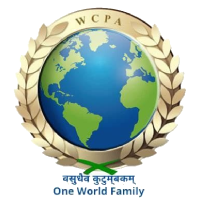WLA 43. Human Trafficking Prohibition
Provisional World Parliament 2 through 7th July 2009, Van Niwas Sri Aurobindo Ashram, Nainital, Uttarakhand, India
On Human Trafficking
Considering the growing worldwide scourge of human trafficking, Firmly committed to world peace and the equality of people, Noting that no peace is possible without justice,
Firmly committed to alleviating the plight of people subjected to trafficking;
Recognizing that there are gender factors in trafficking, with approximately 80% of trafficked people being women and children,
Being resolved to permanently eradicate this inhumane practice,
We the people of the World, assembled here in Nainital, India, adopt this Act to end and prevent human trafficking.
- Definition: Human trafficking is defined by the International Protocol to Prevent, Suppress and Punish Trafficking in Persons, especially Women and Children as “the recruitment, transportation, transfer, harboring or receipt of persons: by the threat or use of kidnapping, force, fraud, deception or coercion, or by the giving or receiving of unlawful payments or benefits to achieve the consent of a person having control over another person, and for the purpose of sexual exploitation or forced labor.”
Trafficking applies to local, national, as well as international movement of persons.
- The Enforcement System and the World Ombudsmus shall take positive steps to combat the trafficking of persons. Trafficking is unlawful (World Class 4 felony).
- Both male and female children are particularly vulnerable. The Enforcement System and the World Ombudsmus shall protect the victims of trafficking as well as those who are most at risk of becoming victims of trafficking. In the case of children, Earth Federation agencies, other public and private agencies shall consider the Rights of the Child as enumerated in World Legislative Act #27, and shall respond with the best interests of the child as the prime consideration. All relevant ministries and governmental bodies shall adopt policies and procedures that favor information-sharing and networking between agencies and individuals working with children. Relevant ministries and bodies include judicial, police, migration, asylum, and social service authorities
Victims of trafficking, including child victims, have the right to receive long-term care and protection including access to health care, social services and education regardless of whether the victims are nationals or residents of the country in which the victims are currently located.
Earth Federation agencies shall give due weight to the views of the child when considering family reunification or return to the child’s country of origin or any other durable measure.
If the World Bench for Juvenile Cases deems the return of trafficked children who are not nationals or residents of the country in which the victims find themselves, Earth Federation agencies shall facilitate the victim’s return to country of origin. Relevant circumstances include, for example, the risk of the child to further trafficking or other exploitation in the child’s country.
The World Ombudsmus and other Earth Federation agencies shall ensure any return of trafficked children to the country or place of origin takes place with advance secure and concrete arrangements for care and custodial responsibilities before return to the country or place of origin.
- The Provisional World Parliament hereby forms a Standing Parliamentary Commission on Trafficking, to be composed of ________ Member Delegates. The Standing Commission shall correspond during the oncoming months to develop further elaboration of this Act. The Committee may consider recommending amendments comprised from provisions in various national and international laws and commissions, such as the International Protocol to Prevent, Suppress and Punish Trafficking in Persons, especially Women and Children, andthe Anti-Trafficking in Persons Act 2007 of Malaysia (Act 670).
The Standing Parliamentary Committee has at least 3 advisors, one trained in laws regarding trafficking, one trained in legislative drafting, and one trained in the health profession.
The Standing Parliamentary Commission shall report its deliberations and findings to upcoming sessions of the World Parliament.
Adopted as amended, 10:50 a.m., 4 July 2009, by the 11th Session of the Provisional World Parliament.
Attested,
Eugenia Almand, JD, Parliament Secretary

